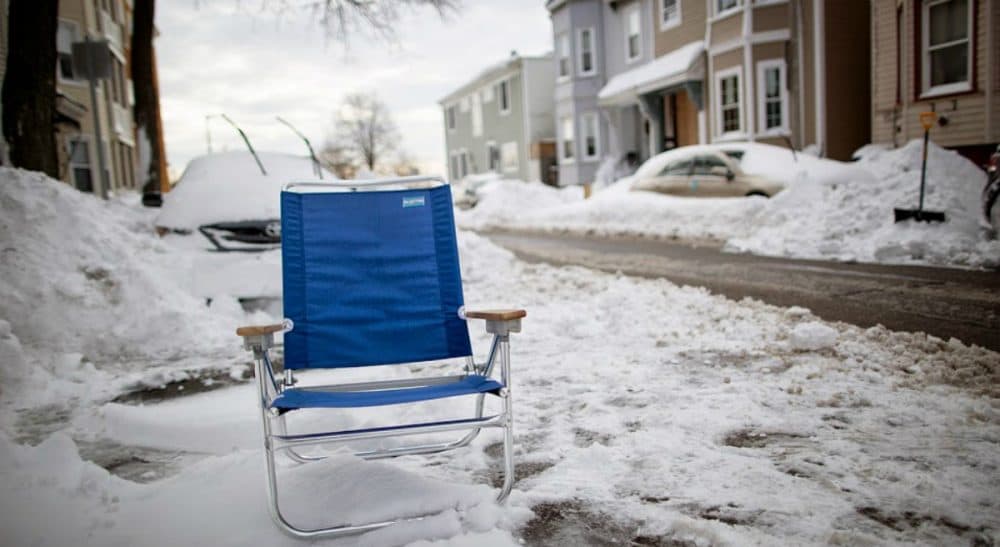Advertisement
The Social Ethics Of Parking Space Savers
Resume
America — or at least Greater Boston — is divided into two types of people.
There are those who feel entitled to hang onto their parking spaces once they’ve cleared them of snow.
Then there are those who shovel out their cars and drive on, not expecting their spots to be there when they get back.
When those in the space-saving camp confront their adversaries, disputes can get heated. Steal a shoveled-out spot marked with a chair, cone or trash can and expect retaliation, from harsh words and slashed tires to violence.
Especially in Boston, where it’s OK to protect your turf (but only for 48 hours after a snow emergency is lifted).
Even in communities where space savers are verboten — such as equality-minded Cambridge, my fair Somerville or the South End (Boston’s first neighborhood to ban the practice) --- woe to those who violate the time-honored tradition of marking your territory with the human equivalent of dog urine.
But let’s dispense with the matter of legality. Let’s move into the realm of social ethics, a field that can feel as slippery and cumbersome as the snow that’s been dumping on us.
Social ethics looks at the tacit, and sometimes legislated, “code of conduct” by which we agree to abide. What is fair or unfair? How are we all cared for equally? The issue spans economics, poverty, tolerance of differences such as religion or sexual preference, and yes, also the environment, public spaces and issues like reserving that igloo-like car-shape in the snowbank for your automobile.
The split between those who hoard their spots, and those who spread the wealth for the next guy, uncovers a philosophical divide. Do I exhume my car and leave, content knowing that "my" spot will soon be snatched up, but trusting that later, I’ll score a spot someone else has shoveled out? Or do I ensure that my shoveling labors are rewarded with a private, albeit temporary, parking space for myself, and my neighbors’ needs be damned?
The split between those who hoard their spots, and those who spread the wealth for the next guy, uncovers a philosophical divide.
The notion that the street belongs to all certainly helps the share the wealth argument. But it doesn’t dig into the true source of the divide. The real battle isn't over public space. It's about two warring schools of thought -- those who believe in short term payoff for one's individual labor, and those who think one’s individual labor should benefit the longer term common good.
Boston Mayor Marty Walsh is clearly in the former bloc. “If you use manual labor to get your car out, I think for 48 hours, a couple days, you can have it,” Walsh was quoted in the Boston Globe as saying. I don’t agree with him, but I can see his rationale. Hey, I did the work. I should reap the benefits.
That’s how America functions — or is supposed to function — for many of its citizens. In Walsh’s words, “You shovel it, you earn it.”
Despite Walsh’s pertinacity, he’s flexible enough to admit some ground rules. You can’t go around marking someone else’s spot that you didn’t shovel yourself, and you can’t lay claim to your spot before the storm has even begun.
In other words, the system shouldn’t reward slackers or opportunists or cheats. Fair enough.
But for the space-sharing crowd, all this attention on singular effort and singular benefit feels not quite right. After all, this country is bigger than “my shovel” and “my wee kingdom of asphalt.” If I were king, fellow citizens, we’d clear our spots, then shovel out everyone else down the whole block as we sing snowy folk songs and offer up mugs of cocoa to the masses.
These broader ethical differences reflect the story of America. Those who consider themselves community-minded (or what the Fox News set calls “Socialists”) want a more equitable relationship with their neighbors. Pay it forward, pool our collective resources and we create a better world. Plowing out your neighbor’s walk isn’t a sign of weakness. Heck, let’s get a Toro for all of us to share. (Question: Why don’t more neighbors do this?)
Those who adhere to the every-able-bodied shoveler for him or herself principle have a different American experience. You pull yourself up from your bootstraps. You don’t need help from anyone. I worry: If you don’t think you might need a parking space in the near future, are you the same person who won’t invest in other long-term projects, like roads, bridges, schools or ice-cream delivery drones? Hence, no handouts. And no, you can’t borrow my Toro. Don't even talk to me about a snow blower share.
How do we get these camps to come together? I don’t know. But it feels like a classic Us versus Them showdown, as familiar as a rift between Democrat and Republican, Congress and the president, Red Sox and Yankees.
All I know is I won’t be surprised if these pissing contests start to create more than just yellow snow — black and blue, perhaps — or even worse, blood red.
